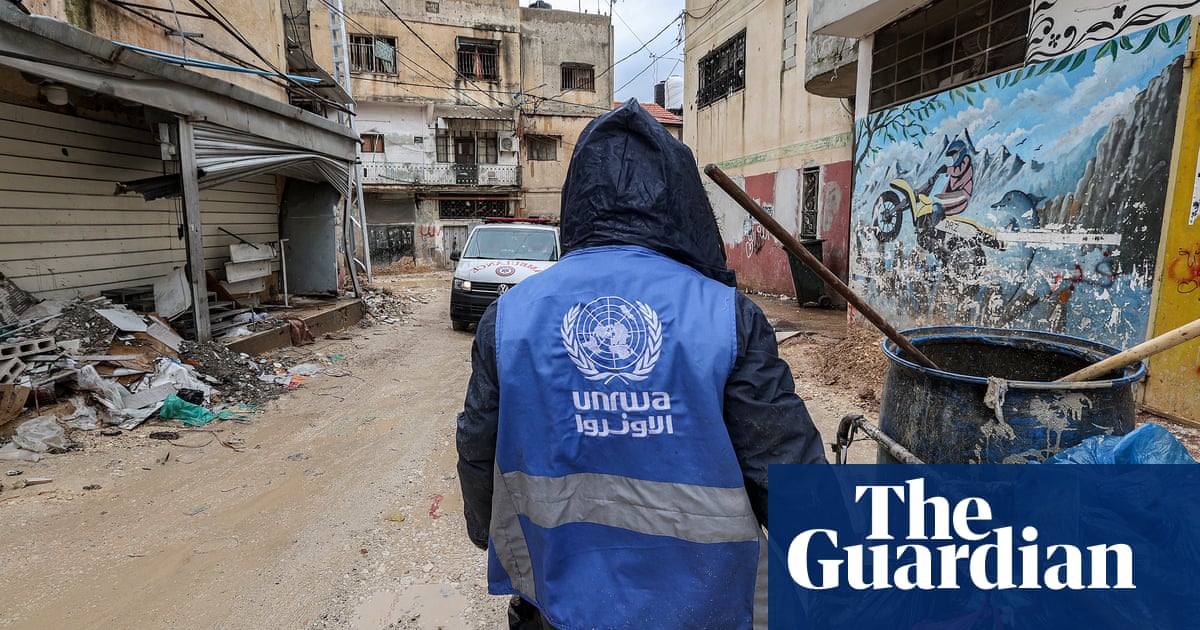
A plan due to be published today to improve the accountability and transparency of Unrwa, the UN relief works agency for Palestinians, is not expected to lead to a snap British decision to restore funding to the agency.
Britain joined 18 other nations in suspending funding for the agency after Israel claimed that 12 of the 30,000 Unrwa staff had participated in the attack on Israel on 7 October. Almost all those countries have restored funding, and the UK government is facing conflicting domestic pressures over whether to do the same. The UK provided £35m last financial year to Unrwa, including £16m extra for humanitarian aid.
Some Conservative MPs and strong supporters of Israel have written to the foreign secretary, Lord Cameron, to warn that it would be a form of moral bankruptcy to resume funding, since they regard the agency as being too close to Hamas. The former home secretary Suella Braverman claimed: “Unwra has been categorically discredited. Hamas has taken over elements of Unrwa and used them for terrorist attacks. For the UK government to divert British taxpayers’ money to fund Unrwa’s activities would be a disgrace. This must not happen.”
They claim the task of food distribution can be undertaken by other agencies such as the World Food Programme, but others say Unrwa has an infrastructure that no other agency can replace.
The independent report prepared by the French foreign minister, Catherine Colonna, and commissioned by the UN is due to be published at noon in New York (5pm BST) after being handed to the UN secretary general, António Guterres, at the weekend.
The report, described as concise and direct, contains a set of recommendations to make the organisation more transparent and accountable. Unrwa has already committed to providing donor countries with full lists of its employees every quarter including, for the first time, their ID card identification.
Among those to have restored funding are the EU, Canada, Australia, Denmark, Finland, Sweden, Germany, France and Japan.
Germany has not yet resumed funding Unrwa’s Gaza operations, but it has done so for those in Jordan, Lebanon and the West Bank. It is possible the UK will take a decision to restore funding soon. The deputy foreign minister, Andrew Mitchell, has previously said he sees no alternative agency capable of carrying out the range of Unrwa’s tasks.
The US Congress has voted to direct the Biden administration not to restore funding to Unrwa until at least March next year. The US is Unrwa’s largest funder, but other countries have stepped forward with additional support to keep the agency going.
In April, Unrwa’s commissioner general, Philippe Lazzarini, called for a separate independent investigation into how the protected status of humanitarian workers and facilities had been blatantly disregarded in Gaza. He claimed Unrwa was facing a campaign to push it out of the occupied Palestinian territory.
He told the UN security council: “In Gaza, the government of Israel seeks to end Unrwa’s activities. The agency’s requests to deliver aid to the north are repeatedly denied. Our staff are barred from coordination meetings between Israel and humanitarian actors.
“Worse, Unrwa premises and staff have been targeted since the beginning of the war.”
He warned that dismantling Unrwa would “have lasting repercussions. In the short term, it will deepen the humanitarian crisis in Gaza and accelerate the onset of famine. In the longer-term, it will jeopardise the transition from ceasefire to ‘day after’ by depriving a traumatised population of essential services.
“It will make nearly impossible the formidable task of bringing half a million deeply distressed girls and boys back to learning.”
UN Watch, the NGO long opposed to Unrwa’s role, has already accused the Colonna report of being a tainted whitewash.